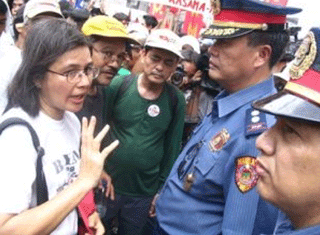Bush/Arroyo State Terrorism in the Philippines
 Dr. Carol Araullo |
When the Permanent People’s Tribunal reached a verdict of “guilty” for systematic violation of human rights (announced in March 25 at The Hague, Netherlands) against Philippine president Gloria Arroyo and U.S. President George W. Bush, Jr., the event signaled a historic milestone in the struggle of oppressed peoples around the world. This is the second time the neocolonial Philippine government is on trial. In 1980, the Tribunal (which succeeded the Bertrand Russell tribunal on U.S. war crimes in Vietnam) found the U.S.-backed Marcos dictatorship guilty of political crimes against his own people. An international united front ushered by the Tribunal contributed to Marcos’ overthrow in 1986.
Since 1986, the Philippines has witnessed the worsening barbaric rule of the local oligarchic puppets of Washington/Pentagon and its agents, the International Monetary Fund, World Bank, and World Trade Organization. U.S. tight control of the Philippine military and police has continued since the country acquired nominal independence from the United States in 1946. While the U.S. military bases have been shut down in 1991, U.S. troops can enter the country anytime anywhere by virtue of unequal agreements and bureaucratic skullduggery. Bush’s scheme of repairing a messianic U.S. hegemony after invading Afghanistan and Iraq has transformed the Philippines into “the second front” in the global war against Al Qaeda and “rogue” states. Philippine president Arroyo immediately kowtowed, allowing the intervention of thousands of U.S. troops into the Philippines in a botched thirty-eight-years-old counterinsurgency drive against the Communist Party of the Philippines and the New People’s Army, declared as “terrorists” by the U.S. State Department in 2002.
The war on terror has been used to justify all illegal actions and the impunity of both governments. The Tribunal pointed to the Armed Forces of the Philippines (AFP) as playing “a central role” in the monstrous atrocities, given the military’s function as a “structural component and instrument of the policy of the ‘war on terror’ in the Philippines” declared by Bush and implemented by Arroyo. The AFP recently saturated with armed soldiers 27 urban poor communities in Metro Manila to intimidate voters favoring opposition political parties in 2007 May elections.
The crisis of the neocolonial order in the Philippines has intensified. Under Arroyo’s illegitimate and corrupt rule (since 2001), the number of extrajudicial killings, forced disappearances or abductions, and torture committed by government security forces grew by leaps and bounds. It has surpassed Marcos’ notorious martial-law murders. As of April 2007, there were 843 killings and 198 forced disappearances. Several United Nations rapporteurs, Amnesty International, the World Council of Churches, Asian Human Rights Commission, and KARAPATAN, the local human-rights monitor, have confirmed these unconscionable atrocities.
UN Special Rapporteur Philip Alston’s visit last February confirmed the consensus of Arroyo’s complicity with the political killings. Reinforcing the view of UN Special Rapporteur Rodolfo Stavenhagen that the government’s lack of political will and competence abets the continuing violations, Alston accused the Philippine military of “almost total denial of its need to respond effectively and authentically to the significant number of killings...convincingly attributed to them.” In his March 22 report, Alston stressed the impact of the unconscionable volume of political killings perpetrated by Arroyo’s military and police: “the impact has been to intimidate vast numbers of civil society actors, to send a message of vulnerability to all but the most well connected, and to severely undermine political discourse.” Alston specifically singles out the AFP’s infamous “order of battle” document of 110 pages listing hundreds of groups and individuals labeled “enemies of the State” and targeted for assassination for their political beliefs.
Arroyo’s method of clinging to power and prevent impeachment in Congress, as well as suppress public criticism, is to label legal civil-society organizations and political parties as “communist fronts.” She is implementing the AFP’s notorious counterinsurgency scheme, Oplan Bantay Laya, which permits the systematic assassination of Arroyo’s political enemies. It is modeled after the U.S. CIA “Phoenix” program applied in Vietnam, El Salvador, and other “dirty war” zones of the Empire. We are now supposedly in the post-Cold War era, but not in this stagnant tropical outpost of the Empire. McCarthyist witch-hunts and secret thought-police are alive and thriving in the Philippines.
The lead attorney for the prosecution in the Tribunal, Edre U. Olalia, argued that this U.S.-inspired counterinsurgency scheme afford the military and police the framework and protective umbrella under which extrajudicial killings are freely undertaken. Moreover, Olalia contends, “the systematic character, frequency, pattern or modus operandi, and impunity with which these crimes and atrocities are committed, the inaction of the national leadership, the systematic covers-up and relevant and revealing government and military documents—all show that there exists a pattern and policy of the government to undertake killings and other human rights violations.”
The Tribunal held Bush and Arroyo accountable for “crimes against humanity.” Other charges included the violations of the Filipino people’s civil and political rights; economic, political, and cultural rights; and violations of the people’s rights to national self-determination and national liberation. Many complainants (victims, eyewitnesses, resource persons) belonged to local people’s organizations whose ranks have been the chief targets of the paramilitary assassins.
One of the distinguished personalities who testified before the Tribunal’s jury was Dr. Carol Pagaduan Araullo, currently the chairperson of the largest multisectoral federation of nationalist, progressive organizations, BAYAN (New Patriotic Alliance). Dr. Araullo, a physician by profession, has been an exemplary militant nationalist since the seventies: she was a student leader at the University of the Philippines and a community organizer in the urban poor communities. In 1973 she was arrested, underwent torture, and was detained without charge for four months in a military detention facility.
In 1989, Dr. Araullo was included in the AFP’s “order of battle” (which Alston earlier condemned as extremely prejudicial, encouraging and facilitating the extrajudicial killings of activists) as a ranking official of the Communist Party of the Philippines, with a price on her head. As a leading officer of BAYAN, she has played a key, substantial role in leading the mass movement for nationalism and democracy. She has been personally harassed, intimidated, and harmed on various occasions. When Arroyo declared a state of emergency in February 2006, Dr. Araullo was unjustly implicated in rebellion cases against six progressive members of the Philippine House of Representatives and scores of dissidents, both legal as well as those publicly known to be in the underground movement.
To illustrate the Arroyo regime’s violent suppression of civil liberties and other constitutionally mandated rights, Dr. Araullo cites numerous cases of violent dispersals of peaceful citizen assemblies, including one in which she was “hosed down with high-pressure water canons and hit on the head by a truncheon-wielding policeman” while other demonstrators were roughed up and terrorized.
What Dr. Araullo underscores in her trenchant argument is the Arroyo regime’s unconscionable violation of all the statutes and principles in the international covenants and other instruments on human rights to which the Philippine government is a signatory. Foremost among them is the 1966 International Covenant on Civil and Political Rights and its Optional Protocol. This Covenant, like the Bill of Rights in the Philippine Constitution, recognizes freedom of expression, speech and the rights of people to peaceably assemble and petition the government for redress of grievances, as well as a whole range of related civil and political rights.
Dr. Araullo lists in detail the numerous authoritarian measures employed by the Arroyo regime to circumvent its obligations both to international law and the Philippine Constitution. Among them are the “calibrated preemptive response” rule to outlaw public rallies, Executive Order 464 to prevent government officials from testifying in Congress (nullifying the oversight functions of Congress and the principle of checks and balances in a democratic polity), and Arroyo’s proclamation No. 1017 which applied the stigma of “terrorism” to any act critical of Arroyo’s policies and the conduct of the military and police.
Dr. Araullo sums up the Arroyo regime’s flagrant curtailment of the right to assemble as a consistently brutal attack on “hundreds of unarmed and peaceful civilians from a broad array of Philippine society.” In a recent commentary in Business World, Dr. Araullo estimates the value of the Tribunal’s role in exposing how the unrelenting human-rights violations “are part and parcel of state policy and that government officials up to the highest levels are responsible for their cover-up and the resulting climate of absolute impunity” for the State-sponsored criminals. Her recent comment on the Anti-Terrorism Bill (ironically called the Human Security Act of 2007 to justify the State terror that Arroyo is bound to put into operation in July, a bill whose provisions on warrantless arrests, expanded detention and interrogation periods, etc. violate the Philippine Constitution) demonstrates her perspicacity and strategic wisdom gained in her extraordinarily rich experience of organizing and nourishing the national-democratic partisans of two generations. Her revolutionary vocation, so ably incarnated in her brave and resolute commitment to the democratic socialist cause, is that of speaking truth to power demonstrated in over 30 years of sustained activism.
Other testimonies during the Tribunal proceedings were all poignant and eloquently persuasive. They presented a lucid and morally cogent portrait of the Arroyo dispensation as one of the most barbaric and heinous ever inflicted on the Filipino people. Prompted by the National Council of Churches of the Philippines (see their powerful brief, “Let the Stones Cry Out,” March 2007), Amnesty International, and other groups, U.S. Senator Barbara Boxer and other U.S. State Department officials have begun to question how U.S. military aid is being utilized in the pursuit of the “war on terrorism” in the Philippines, a war that Bishop Desmond Tutu condemned as Arroyo’s pretext for oppressing and killing her own people.
Writing on the Alston Report, Australian professor Peter Sales bewails that the Philippine “political situation has lost its moral direction.” But is Arroyo (with her generals and flunkeys) the only player in the field? We have many Filipinos who are emulating Dr. Araullo and other progressive national-democrats—in fact, millions of organized, responsible militants from Aparri to Jolo who are dedicated to giving it a moral, emancipatory collective direction. They are ready to sacrifice their lives to rid the country of the evils of U.S. imperialism and its shameless hirelings represented today by the brutal and corrupt Arroyo fraction of the comprador-landlord-bureaucrat capitalist ruling bloc supported by U.S. imperialist policies and administrators.


